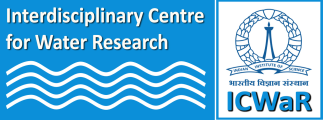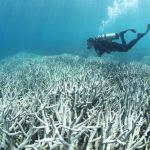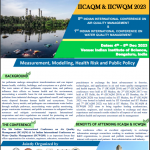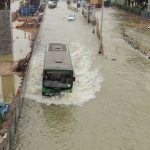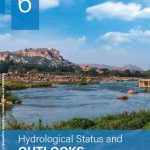Water sanitation in the times of Covid-19 pandemic
Name of the Speaker: Dr. Utpal Tatu
Title of the Seminar: Water sanitation in the times of Covid-19 pandemic
Date and Time: 19th November 2020 (Thursday), 4:30 PM
Online Platform: MS Teams
About the Speaker: Dr. Utpal Tatu is a professor at the Indian Institute of Science He obtained his his PhD from Department of Biochemistry at Indian Institute of Science and pursued his postdoctoral research at Yale School of Medicine, New Haven, Connecticut where he went on to become an Assistant professor His most notable research delves into neglected and emerging infectious diseases with a focus to develop better treatments and diagnostic solutions.
His research interests include interface between human, animal and environment with One health concept On going research on amoebiasis, Bebesiosis Candidiasis, Cryptococcosis,
Giardiasis, Rabies, Trichomonosis and Trypanosomisis Most noably he has developed diagnostic solutions for antemortem diagnosis of Rabies, point of care diagnosis for Trypanosomosis and most recently for Covid 19 which is endorsed by ICMR He has received numerous accolades Birla science prize, Bioscience career development award from DBT and Ranbaxy Research Award to name a few He is an elected fellow of the Indian Academy of Sciences He was formerly the Presidents of both the Proteomics Society of India and Vice President of the Indian Society for Mass Spectrometry He is also an editorial board member of the Parasitology Journal published by the Cambridge Press.
Prof. Tatu is keen on applying his expertise in Mass Spectrometry as well as infectious diseases to address global health problems due to contaminated water.
Abstract: Water safety and quality are fundamental problems in underdeveloped and developing countries like India Approximately half of our country’s population practice open defecation and thrive in poor sanitary condition A significant number of communicable diseases in India are due to unsafe water and the lack of hygiene practices Contaminated water results in various gastrointestinal complications, diarrhea being the most common Diarrhea is the third leading cause of childhood mortality in India and is responsible for 13 of all deaths annually in children under 5 years of age.
My lab at IISc has been studying neglected and emerging infectious diseases, including various gastrointestinal pathogens. We take into account interactions between humans, animals and their environment to understand the emergence and spread of infectious diseases Our aim is to improve global health by minimizing risks of infection by ensuring clean food, feed, air and water. We have the expertise to address issues of water safety standards and technology to identify undesirable chemical as well as microbiological components in natural water resources. To minimize the burden of deaths caused due to consumption of impure water, a solution would be to develop early and accurate detection and removal of gastrointestinal pathogens such as Giardia, Entamoeba, Cryptosporidium, Salmonella, Shigella, Campylobacter, Shigella toxin producing Escherichia coli and Rotavirus We also monitor the quality standards of natural water resources ground water, rivers, lakes and oceans. By using most sensitive and specific molecular methods such as mass spectrometry we ensure detection of ppb level contaminants in water.
Date/Time
Date(s) - 19/11/2020
4:30 pm - 5:30 pm
